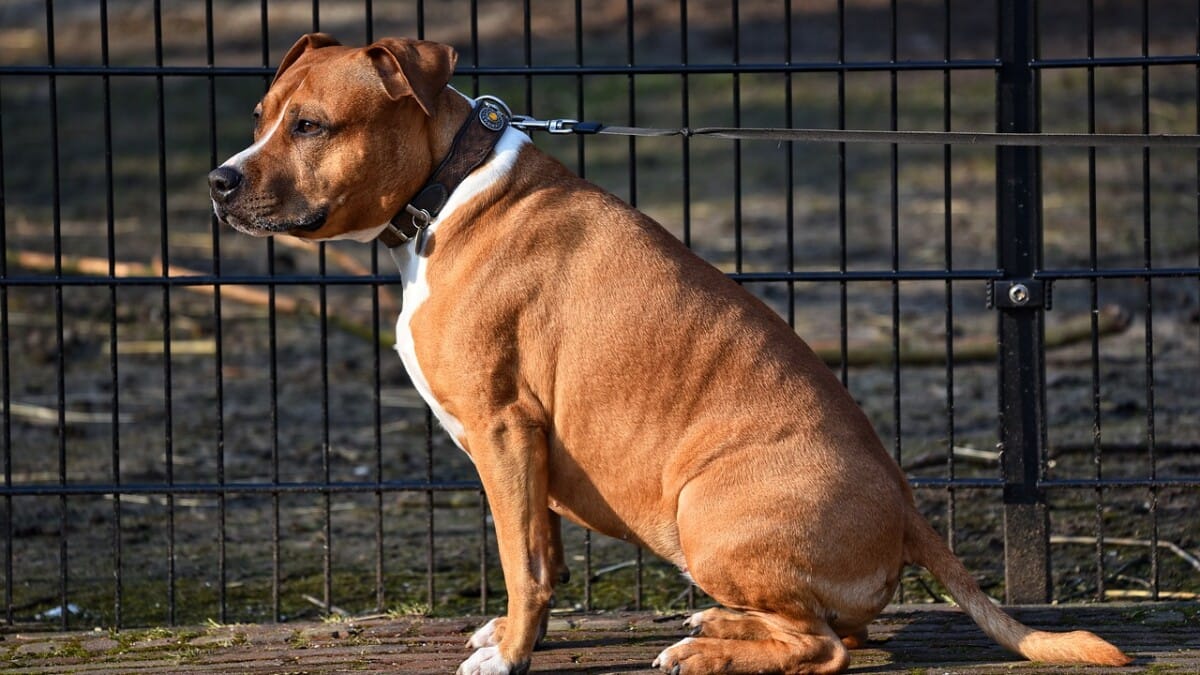Dogs hold a special place in our lives. Often referred to as “man’s best friend,” they provide companionship, loyalty, and unconditional love. As pet owners, it’s our responsibility to ensure their well-being. This includes providing them with a safe, comfortable, and enriching environment. Chaining a dog outside for extended periods can pose several dangers to their physical and mental health.
Leaving a dog chained up limits their ability to exercise, socialize, and escape harsh weather conditions. If you’re a dog owner in Virginia and wondering about the legality of chaining your pet outdoors, this blog post dives into the specifics of the state’s tethering laws. We’ll explore what’s allowed, what’s prohibited, and how to ensure your furry friend receives the care they deserve.
Chaining Laws in Virginia: Not a Blanket Ban, But Protections in Place
Unlike some states with complete bans on chaining dogs outside, Virginia allows tethering with certain regulations. These regulations aim to prevent cruelty and ensure chained dogs have access to basic necessities and some level of comfort. Responsible pet ownership is still paramount, even when following the legalities.
Decoding Virginia’s Tethering Laws: A Breakdown of Key Points
Let’s unpack the key points of Virginia’s tethering laws to understand what’s expected from dog owners:
- Minimum Tether Length: The tether must be long enough to allow the dog normal movement, including the ability to turn around comfortably and lie down in a shaded area. This prevents strangulation, entanglement, and injuries.
- Access to Necessities: A tethered dog must have constant access to clean, fresh water and appropriate food. Additionally, they require adequate shelter that protects them from the elements, including shade from the sun and a dry place to escape rain, snow, or wind.
- Weather Limitations: Virginia law prohibits tethering dogs outside during extreme weather events. This includes times when temperatures reach 32 degrees Fahrenheit or below or 85 degrees Fahrenheit or above. Tethering is also not allowed during storms like hurricanes, tornadoes, or periods with severe weather advisories.
Consequences of Violating Tethering Laws:
Failing to comply with Virginia’s tethering laws can result in charges of animal cruelty. Depending on the severity of the neglect and the dog’s condition, penalties can include fines, community service, or even jail time. More importantly, a tethered dog left without proper care can suffer from dehydration, heatstroke, hypothermia, and injuries.
Beyond the Leash: Virginia’s Animal Cruelty Laws and Responsible Ownership
While tethering restrictions offer some protection, Virginia has broader animal cruelty laws that encompass more than just chaining a dog outside. These laws make it illegal to intentionally inflict pain, suffering, or death on any animal. This includes denying them necessary food, water, shelter, veterinary care, or any act that causes them undue physical or mental distress.
Responsible pet ownership goes beyond the legalities. It’s about providing your dog with a loving home, proper socialization, opportunities for exercise and mental stimulation, and regular veterinary checkups.
Alternatives to Chaining:
If tethering is not ideal for your situation, there are several alternatives to consider:
- Fenced-in Yard: A secure fenced-in yard allows your dog to roam freely within a designated area while still being contained.
- Tether with Supervision: Short-term tethering can be acceptable for brief periods under direct supervision, ensuring access to water, shade, and the ability to move comfortably. This can be helpful during specific outdoor activities like car washing or yard work, but not as a long-term solution.
- Indoor/Outdoor Dog Runs: These pre-fabricated structures offer a designated space for your dog to be outdoors while remaining secure. However, they still require proper shelter and access to fresh water within the run.
- Training and Leash Walking: Investing time in training your dog can allow for safe walks and playtime on a leash. This strengthens your bond with your pet and provides them with necessary exercise and mental stimulation.
- Pet-Friendly Rentals: Many apartments and houses now offer pet-friendly options. Researching these options can ensure your dog has a safe and comfortable indoor space when you’re not home.
Case Studies: Highlighting the Impact of Tethering Laws
While Virginia’s tethering laws offer some level of protection, real-life examples showcase the importance of responsible pet ownership and the potential consequences of neglect.
Imagine a scenario in Virginia Beach, a coastal city known for its hot summers. A dog chained in a backyard with inadequate shade and no access to water suffers from heatstroke. This situation not only violates tethering laws but also causes immense suffering to the animal.
In contrast, consider a resident of Richmond, Virginia, who uses a tether for short periods while actively supervising their dog during outdoor play sessions. The dog has access to fresh water, shade, and can move freely within the tether’s limitations. This scenario demonstrates responsible tethering practices within the legal framework.
Conclusion: Keeping Your Canine Companion Safe and Happy in Virginia
Virginia’s tethering laws establish some ground rules for dog owners, but true responsible pet ownership goes beyond legal compliance. It’s about creating a loving and enriching environment where your dog can thrive. Remember, your dog is a valued member of your family, and their well-being should be a top priority.
Here are some resources to help you become a better pet owner in Virginia:
- Virginia Department of Agriculture and Consumer Services (VDACS): https://www.vdacs.virginia.gov/animals.shtml
- Virginia Federation of Humane Societies: https://www.vfhs.org/
- American Society for the Prevention of Cruelty to Animals (ASPCA): https://www.aspca.org/
By understanding the tethering laws, prioritizing your dog’s needs, and exploring alternative containment methods, you can ensure your furry friend enjoys a happy and healthy life in Virginia. Remember, a strong bond is built on love, care, and respect, not a chain.



